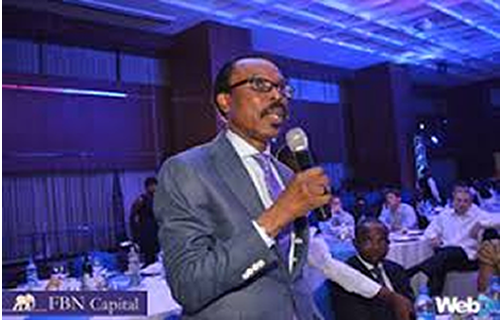
With concern growing over the impact of naira devaluation on lenders’ capital adequacy, leading financial experts, including the Chief Executive Officer, Financial Derivatives Company (FDC), Limited, Mr. Bismarck Rewane, have predicted that the current crisis facing banks in the country is likely to trigger a consolidation in the industry.
Pressure has been increasing on banks in recent months as rising Non- Performing Loans (NPLs), a shrinking economy, the falling naira and acute foreign exchange shortages, have led to several lenders sacking staff, closing branches and slashing earnings forecast.
However, analysts believe that the recent floating of the naira, which has resulted in over 40 per cent depreciation of the local currency since June 20, will further compound the woes of banks, especially those with a high ratio of dollar loans.
Reuters reported Rewane at the weekend as predicting that not all banks will survive the storm. He was quoted by the news agency as saying, “It (crisis) will affect their profitability initially and eventually it is going to affect their liquidity and solvency.
Because of the squeeze in profitability, there will be a natural consolidation and a shake out.” The Chief Executive Officer, Sterling Bank Plc., Mr. Yemi Adeola, predicted last December that the tough times would trigger a consolidation in the industry.
Also, the bank’s Chief Financial Officer (CFO), Mr. Abubakar Suleiman, said last February that a naira drop of just 20 per cent would trigger a “wave” of bank mergers. Overall, 42 per cent of loans extended by Nigerian banks are in dollars.
If the naira falls far enough, it will force some banks to recapitalise to have enough naira to stay within financial stability limits. In a recent note, Standard Chartered Africa Chief Economist, Razia Khan, said: “There is concern around the evolution of banks’ capital adequacy if the naira continues to weaken.
As the naira weakens, FX loans are likely to be problematic.” Similarly, Reuters reported London-based analysts, Exotix, as saying, UBA, Diamond and Guaranty Trust Bank (GTB), which is Nigeria’s biggest bank by market capitalisation, have the highest ratio of dollar loans, at 50 per cent apiece. UBA and GTB have said they saw no need for a recapitalisation due to the devaluation.
In addition, according to the news agency, some lenders have themselves borrowed heavily in dollars, debt that now costs much more to service. Data obtained from Thomson Reuters show that GTB has $1.6 billion in dollar-denominated debt, followed by First Bank of Nigeria, with $915 million.
Last week, the apex bank directed banks to review and make adequate provisioning for all delinquent foreign currencydenominated loans in line with the July 1, 2010 Prudential Guidelines for Deposit Money Banks in Nigeria.
The CBN said, in a letter by its Director, Banking Supervision, Mrs. Tokunbo Martins, entitled: “Provisioning for Foreign Currency Loans,” that the move was in continuation of the efforts to enhance efficiency, facilitate liquidity and transparency in the foreign exchange market.
In a note, Nigeria’s leading rating agency, Agusto & Co., said NPLs are expected to jump to 12.5 per cent of total loans this year, up from the CBN’s target level of 5 per cent at the end of last year.
One Lagos-based banking analyst, who asked not to be named, said three or four medium-sized banks might need to raise capital. The CBN has said it is monitoring one or two lenders for liquidity, without naming them.
However, the CBN Governor, Mr. Godwin Emefiele, has urged people not to panic about the banking system, saying the apex bank is on top of any trouble resulting from the worst crisis in Africa’s biggest economy for decades.
The regulator recently shored up mid-tier lender, Skye Bank, with a loan and replaced its management following a weakening of the lender’s prudential ratios. Any failure of the banking sector would have farreaching consequences in the nation of 170 million, with civil servants’ pay routed through the banks and residents of remote villages dependent on electronic systems for routine payments.
“The strategic health of the Nigerian banking or financial system remains strong at this time. There is no need for anybody to begin to panic or worry that any bank is in distress,” Emefiele said after a meeting of the apex bank’s Monetary Policy Committee (MPC) meeting last Tuesday.
-New Telegraph

